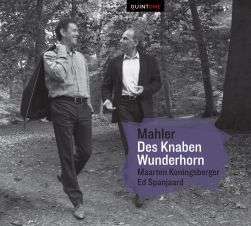|
|
|
Back
09/25/2013
Gustav Mahler: Des Knaben Wunderhorn
Maarten Koningsberger (baritone), Ed Spanjaard (piano)
No information on recording date or venue – 67'14
Quintone Q12001 – Notes in English; texts in German and English

   
This CD comes as a wonderful discovery full of dramatic expressiveness.
The title is a bit misleading in that it implies that the CD contains all 24 songs Gustav Mahler composed from the vast (723 poems!) Des Knaben Wunderhorn collection of German folk poetry. Mahler composed songs from the collection from 1887 to 1902; the CD contains 17 of them which turns out to be a good overview. The performance order is not chronological; instead, more extroverted pieces alternate with the more inward-looking songs.
Most recordings of Wunderhorn songs appear on recordings that also include some of Mahler’s more arioso outpourings, notably the five songs to poems by Friedrich Rückert. Sixty-seven solid minutes of the strophic Wunderhorn songs is a lot in one go - best to give oneself an intermission. Maarten Koningsberger and Ed Spanjaard perform the songs with such total identification with the pieces one can only assume they performed them several times in public prior to making the recording. I envy those who had a chance to hear them.
One cavil: Mr Koningsberger’s voice has the occasional dry patch, but this is not problem given the riveting interpretation he gives to each song.
Another big plus here: full texts with an English translation. Thank you, Quintone
There is no information as to when and where the recording was made. Mr Koningsberger appears on YouTube performing some of these songs in 2012 and I assume the recording was made about the same time.
There is one error in the booklet where Mr Spanjaard recounts the harrowing connection between his family and the Mahler family. Gustav Mahler’s sister, Justine, married Arnold Rosé who spent 40 years as the concertmaster of the Vienna Philharmonic Orchestra (until 1938 when he was summarily dismissed by the Nazi authorities). His daughter Alma Rosé was sent to Auschwitz where she became head of the prison camp’s orchestra, where Mr. Spanjaard’s mother, also incarcerated there, knew her. His error lies in referring to Alma Rosé’s father as Alfred Rosé, who was actually Alma’s brother.
To sum up: this is a top-notch introduction to works that are central to Mahler’s œuvre.
Michael Johnson
|
|
|
Copyright ©ConcertoNet.com